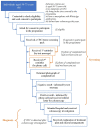Budget impact analysis of a home-based colorectal cancer screening programme in Malaysia
- PMID: 36944471
- PMCID: PMC10032398
- DOI: 10.1136/bmjopen-2022-066925
Budget impact analysis of a home-based colorectal cancer screening programme in Malaysia
Abstract
Objectives: The 2020-2022 research project 'Colorectal Cancer Screening Intervention for Malaysia' (CRC-SIM) evaluated the implementation of a home-based CRC screening pilot in Segamat District. This budget impact analysis (BIA) assessed the expected changes in health expenditure of the Malaysian Ministry of Health budget in the scenario where the pilot programme was implemented nationwide vs current opportunistic screening.
Design: Budget impact analysis. Assumptions and costs in the opportunistic and novel CRC screening scenarios were derived from a previous evaluation of opportunistic CRC screening in community health clinics across Malaysia and the CRC-SIM research project, respectively.
Setting: National level (with supplement analysis for district level). The BIA was conducted from the viewpoint of the federal government and estimated the annual financial impact over a period of 5 years.
Results: The total annual cost of the current practice of opportunistic screening was RM1 584 321 (~I$1 099 460) of which 80% (RM1 274 690 or ~I$884 587) was expended on the provision of opportunistic CRC to adults who availed of the service. Regarding the implementation of national CRC screening programme, the net budget impact in the first year was estimated to be RM107 631 959 (~I$74 692 546) and to reach RM148 485 812 (~I$103 043 589) in the fifth year based on an assumed increased uptake of 5% annually. The costs were calculated to be sensitive to the probability of adults who were contactable, eligible and agreeable to participating in the programme.
Conclusions: Results from the BIA provided direct and explicit estimates of the budget changes to when implementing a population-based national CRC screening programme to aid decision making by health services planners and commissioners in Malaysia about whether such programme is affordable within given their budget constraint. The study also illustrates the use and value of the BIA approach in low-income and middle-income countries and resource-constrained settings.
Keywords: HEALTH ECONOMICS; Health policy; ONCOLOGY; PUBLIC HEALTH.
© Author(s) (or their employer(s)) 2023. Re-use permitted under CC BY. Published by BMJ.
Conflict of interest statement
Competing interests: None declared.
Figures



References
-
- Global Cancer Observatory: Cancer Today [Internet]. International Agency for Research on Cancer. 2020. Available: http://gco.iarc.fr/today
-
- Ministry of Health Malaysia . Malaysian national cancer registry report 2012-2016; 2020.
Publication types
MeSH terms
Grants and funding
LinkOut - more resources
Full Text Sources
Medical
